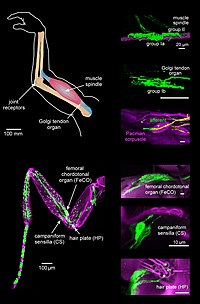
Photo from wikipedia
OBJECTIVE To develop a system of reliable and valid knowledge assessments of self-management in persons with lower limb loss, along with the accompanying targeted educational interventions (TEIs), known as the… Click to show full abstract
OBJECTIVE To develop a system of reliable and valid knowledge assessments of self-management in persons with lower limb loss, along with the accompanying targeted educational interventions (TEIs), known as the Self-Management Assessment for the Residuum and prosThesis (SMART) system. DESIGN This 2-phase study used mixed methodology. Phase 1 was development, face validation, and content validation of the 60-item knowledge assessment measure (SMART 60) and the TEI. Phase 2 assessed internal consistency reliability using Kuder-Richardson Formula 20 and the creation of the SMART system, consisting of modules developed from the SMART 60. Validity of the measures using known groups' comparison was analyzed by comparing clinicians (prosthetists and physical therapists) with persons with lower limb loss. Participants were recruited from the Amputee Coalition National Conference in 2018 and 2019. RESULTS A total of 140 participants completed this study. Four modules from the SMART 60 were created and designed to integrate as a system. Face validity survey average scores found that 9/10 participants either agreed or strongly agreed that the SMART system has high readability, perceived usefulness, and value for both new and experienced prosthetic users. Measure length ranged from 10 to 45 items with a reliability ranging from Kuder-Richardson Formula 20 = 0.70-0.82. The SMART system demonstrated known-groups validity (p < 0.05). CONCLUSION The SMART system is an integrated series of self-management knowledge assessments with reasonable to good internal consistency reliability and known-groups validity. The TEIs provide directed solutions to identified knowledge gaps on the assessments.
Journal Title: Prosthetics and orthotics international
Year Published: 2023
Link to full text (if available)
Share on Social Media: Sign Up to like & get
recommendations!